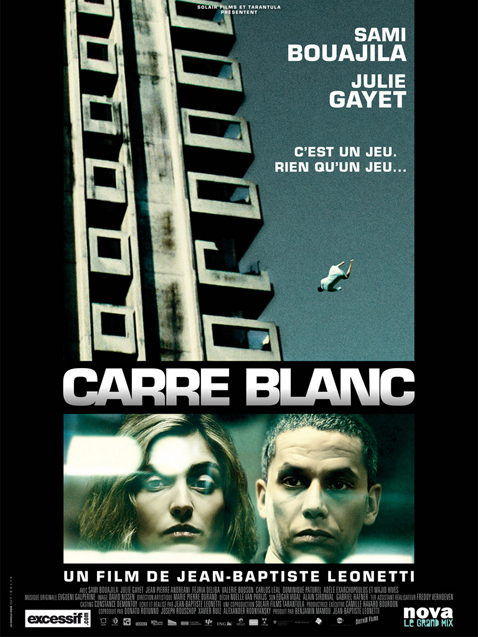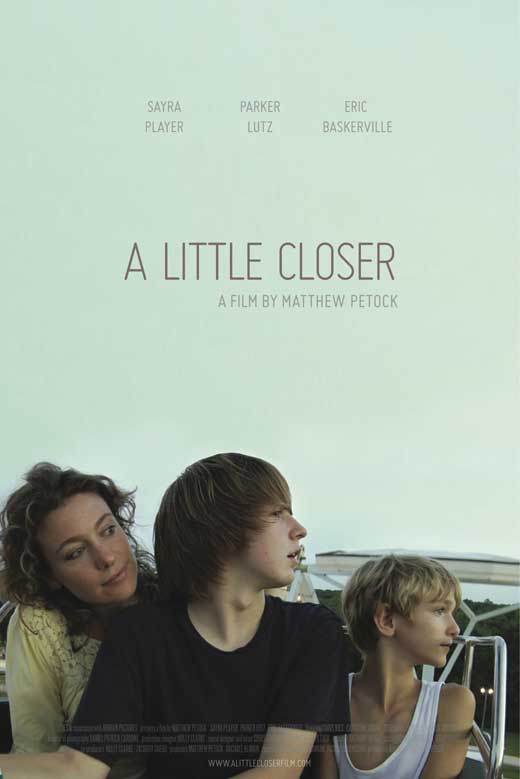This will be our 3rd Indie Night at Film Society Of Lincoln Center, and although I have been programming movies for you for close to three years now, I have not yet been able to bring you any sci-fi films. That changes with this offering, and, man, it's been worth the wait.
When first features work, as this one does, they can be remarkable displays, often representing what the director has long dreamed of expressing, free of the general self-censorship that market considerations bring. On their first feature, creators often feel a far greater pressure to demonstrate what their authorial voice represents; perhaps it is because of this pressure that it is hard to find true confidence and discipline on display in many early works. But, holy cow, that is that not the case with Jean-Baptiste Leonetti's CARRÉ BLANC (White Square) — yet a further proof of the colossal wave of international greatness that is defining cinema today.
Whereas America's corporately engineered cinema implicitly lusts for a dystopian future while it delivers pat excuses of psychological backstory (instead of character complexity), empty images full of flash (but devoid of real-world emotion, politics, ethics, or meaning), surface level editing (that removes any understanding of place), a willingness to introduce new narrative elements solely to advance the plot, & shock (for sensation not understanding), cinema worthy of the term art — like CARRÉ BLANC — does quite the opposite. If you are looking for an antidote to THE HUNGER GAMES or even want to see a true alternative, join us. Some people may call CARRÉ BLANC too tense or brooding, dark or bleak — but for me it is nothing short of exhilarating, heartfelt, electrifying. thoughtful, and fully capable of maintaining a sense of humor and fun in these dark times.
Leonetti's nameless and brutal totalitarian regime is far more scary than what we've been delivered as of late precisely because it seems like a future we not only could have had, but still might. CARRÉ BLANC is delivered in haunting precise images, sounds, and actions. Full of legitimate suspense, references and riffs, from Stanley Milgram's social science experiments to classic sic-fi cinema like SOYLENT GREEN & SILENT RUNNING, we are given a world that extends far beyond the narrative's confines, where constant threat of violence indicates the begging need for revolution — be it of the society and it's practices or that of the individual's heart and mind. At the heart of CARRÉ BLANC remains a love story, capturing both the trauma and shared mission that modern society needs to breed honest love and it does this with us, not in spite of us.
This is a world of cinema that I want more of: sci-fi for adults, expressing ideas while maintaining a discipline, love, and even sense of humor for composition, and an appreciative commitment to both restraint and excess — the ying/yang that makes each element truly sing. CARRÉ BLANC is a film that benefits from its financial limitations, enhancing its art with imagination, while remaining committed to cinema's core attributes of image, sound, & time (composition, juxtaposition, pace). It raises the bar for what we should demand from all cinema.
CARRÉ BLANC is the type of film that summons your memories of great works by the great directors, and it doesn't suffer for it. BRAZIL, 2001, SOLARIS, THX 1138. It made me giddy in the same way that Aronofsky's PI & Jone's MOON did, in that I knew a major new director arrived, and one that would take me to places I myself would never imagine, yet once arrived, would forever dream (not always pleasantly!) about.
Order tickets: www.filmlinc.com/films/on-sale/carre-blanc
If the following review doesn't make you order a ticket right now then you clearly are not the audience for the film: www.dailyfilmdose.com/2011/09/tiff-2011-carre-blabc.html
"George Orwell as filtered through Andrei Tarkovsky" — Todd Brown / Twitch.com
And more: smellslikescreenspirit.com/2011/09/carre-blanc-review/
Watch the trailer here: www.youtube.com/watch?v=l3X4YW50Ptk
And please come see the film Wednesday May 2nd at 8:00 PM at the Elinor Bunin Monroe Film Center at the Film Society of Lincoln Center.
Wed, May 2
8:00 PM
Elinor Bunin Monroe Film Center
144 W. 65TH St
New York, NY 10023
Take a break and come join me, director Jean-Baptiste Leonetti, and some of his team at Film Society of Lincoln Center’s “Indie Night”.
Most sincerely, and forever hopeful about film,
Ted






